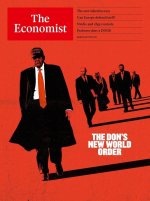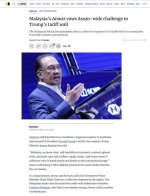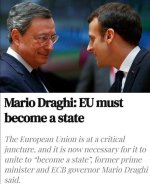Scott
Verified User
I've been following a substacker named Simplicius for a while now, as I've found his articles to be quite good. Today, he wrote one on Trump's policies, as well as what certain financial interests have to say about this, and why they're saying it. The first part of it can be seen here for free:

 simplicius76.substack.com
simplicius76.substack.com
The rest is behind a paywall. Since I'm not a paying subscriber, I only see the first part as well. Here it is:
**
The establishment shrieks grow louder each day over Trump’s disassembling of the so-called ‘Post-War Order’. It is an order that served to benefit only the global finance elites, allowing them to create vast cartel enterprises which could bypass the sovereign laws of any nation to facilitate predatory arbitrage via scams like NAFTA, the WTO, Trans-Pacific Partnership (TPP), et al, where the corporations could make a killing by exploiting their ability to simultaneously impoverish nations while bilking their poor workers.
Last month the Economist proclaimed that the “rupture” of this mythical order on which Western imperialism has balanced for 70 years is ‘gaining pace’:

Likening the Donald to a mafia don, the Rothschild-owned Economist rag served up a platter of fear-inducing threats from its globalist clientele, like Germany’s Merz, who warned that NATO may be dead by this June. Their opening stanza admonishes that we are only now entering a “might-is-right” world, where big powers bully small ones:
The Economist takes us for amnesiacs if they believe we can so quickly forget the previous 70 years of American dragooning of virtually every country under the sun, particularly in its own backyard; what with the endless ‘interventions’ in places like Grenada, Nicaragua, Cuba, Panama, and many more. Bullying seems to only count against one’s putative ‘allies’—other nations are dehumanized with a different ruleset applied: to lay tariffs on the EU is ‘bullying’, while bombing Yemen is merely justified ‘policing’.
But dispensing with the aperitif—the true dark, revealing heart of the article comes next:
“The foreign business of American firms is worth $16trn,” the Economist boasts. And what does the average American gain from the market capitalization of these firms, which are effectively no longer American? Nothing but ever-increasing prices and a gutted economy.
As an ironic aside, the very same Economist issue contains the following damning article:

It refutes their own earlier argument by lamenting that Western nations have deteriorated to such a degree that one essentially needs to inherit wealth to buy a house, or generally ‘make it’ in life. They conclude:

Two years ago, such calls were already being spearheaded by turbo-globalist bankster prince Mario Draghi:

Critical to Draghi’s argument was the following justification—take note:

MAGA-stroika Heralds New Age
Caesar-like rebirth, chemotherapy for globalism, or just Perestroika for the End of History?
The rest is behind a paywall. Since I'm not a paying subscriber, I only see the first part as well. Here it is:
**
The establishment shrieks grow louder each day over Trump’s disassembling of the so-called ‘Post-War Order’. It is an order that served to benefit only the global finance elites, allowing them to create vast cartel enterprises which could bypass the sovereign laws of any nation to facilitate predatory arbitrage via scams like NAFTA, the WTO, Trans-Pacific Partnership (TPP), et al, where the corporations could make a killing by exploiting their ability to simultaneously impoverish nations while bilking their poor workers.
Last month the Economist proclaimed that the “rupture” of this mythical order on which Western imperialism has balanced for 70 years is ‘gaining pace’:

Likening the Donald to a mafia don, the Rothschild-owned Economist rag served up a platter of fear-inducing threats from its globalist clientele, like Germany’s Merz, who warned that NATO may be dead by this June. Their opening stanza admonishes that we are only now entering a “might-is-right” world, where big powers bully small ones:
What a relief it is to know that our now waning ‘golden age’ existed totally in absence of strong powers like the US bullying other nations.Fast approaching is a might-is-right world in which big powers cut deals and bully small ones. Team Trump claims that its dealmaking will bring peace and that, after 80 years of being taken for a ride, America will turn its superpower status into profit. Instead it will make the world more dangerous, and America weaker and poorer.
The Economist takes us for amnesiacs if they believe we can so quickly forget the previous 70 years of American dragooning of virtually every country under the sun, particularly in its own backyard; what with the endless ‘interventions’ in places like Grenada, Nicaragua, Cuba, Panama, and many more. Bullying seems to only count against one’s putative ‘allies’—other nations are dehumanized with a different ruleset applied: to lay tariffs on the EU is ‘bullying’, while bombing Yemen is merely justified ‘policing’.
But dispensing with the aperitif—the true dark, revealing heart of the article comes next:
This outlines the real core of what the Economist’s owners are trying to protect: predatory neoliberal ‘free market’ globalist imperialism. The anonymous author describes major benefits of this ‘system’ that Trump purportedly threatens. These ‘benefits’ primarily go to transnationalist mega-corporations which have long discarded any loyalty to American ‘stakeholders’, the very ones which generally bank-rolled and subsidized those corporations’ rise to power.The world will therefore suffer. What Mr Trump does not realise is that America will suffer, too. Its global role has imposed a military burden and an openness to trade that has hurt some American industries. Yet the gains have been much greater. Trade benefits consumers and importing industries. Being the heart of the dollar financial system saves America over $100bn a year in interest bills and allows it to run a high fiscal deficit. The foreign business of American firms is worth $16trn. Those firms thrive abroad because of reasonably predictable and impartial global rules on commerce, rather than graft and transient special favours—an ethos that suits Chinese and Russian firms far better.
“The foreign business of American firms is worth $16trn,” the Economist boasts. And what does the average American gain from the market capitalization of these firms, which are effectively no longer American? Nothing but ever-increasing prices and a gutted economy.
As an ironic aside, the very same Economist issue contains the following damning article:

It refutes their own earlier argument by lamenting that Western nations have deteriorated to such a degree that one essentially needs to inherit wealth to buy a house, or generally ‘make it’ in life. They conclude:
Trump threatens to upend this ‘prosperous’ world order which has led to an entire ‘lost generation’ drowned in inflationary malaise, cultural decay, and an economic death spiral. It becomes clear that establishmentarians only care about party dogma, no matter how clunkily it tangles with logic and objective reality.This shift has alarming economic and social consequences, because it imperils not just the meritocratic ideal, but capitalism itself.
What we see happening now is the world reordering itself along various defensive blocs. After Trump’s tariff announcement, an ‘emergency’-style meeting of ASEAN nations was called by the bloc’s chair Malaysia, scheduled for April 10, in order to craft a unified response.Advocates of dealmaking assume that America can get what it wants by bargaining. Yet as Mr Trump exploits decades-old dependencies, America’s leverage will rapidly fall away.

Similarly there are now calls from within the EU establishment to push for even more centralization, a long-held dream of Euro-technocrats. The convenient argument is that only a ‘unified’ Europe can stand up to the big bullies of the world during an era of ‘great power politics’.Malaysia’s PM says the region is preparing a 'united ASEAN response' rather than yielding to pressure
Two years ago, such calls were already being spearheaded by turbo-globalist bankster prince Mario Draghi:

Critical to Draghi’s argument was the following justification—take note:
**“Today, the growth model has dissolved, and we need to reinvent a way of growing, but to do this, we need to become a State”, he said.


